
The 1884 United States presidential election was the 25th quadrennial presidential election, held on Tuesday, November 4, 1884. In the election, Governor Grover Cleveland of New York defeated Republican James G. Blaine of Maine. It was set apart by mudslinging and personal allegations that eclipsed substantive issues, such as civil administration change. Cleveland was the first Democrat elected president of the United States since James Buchanan in 1856, the first to hold office since Andrew Johnson left the White House in 1869, and the last to hold office until Woodrow Wilson, who began his first term in 1913. For this reason, 1884 is a significant election in U.S. political history, marking an interruption in the era when Republicans largely controlled the presidency between Reconstruction and the Great Depression.

The Prohibition Party is a political party in the United States known for its historic opposition to the sale or consumption of alcoholic beverages and as an integral part of the temperance movement. It is the oldest existing third party in the United States and the third-longest active party.

Silas Comfort Swallow was a United States Methodist preacher and prohibitionist politician who was a lifelong opponent of slavery. He was the Prohibitionist presidential nominee in 1904.
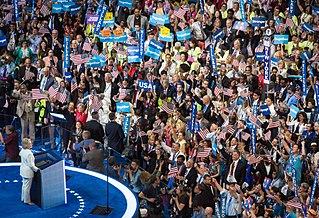
The Democratic National Convention (DNC) is a series of presidential nominating conventions held every four years since 1832 by the United States Democratic Party. They have been administered by the Democratic National Committee since the 1852 national convention. The primary goal of the Democratic National Convention is to officially nominate a candidate for president and vice president, adopt a comprehensive party platform, and unify the party. Pledged delegates from all fifty U.S. states, the District of Columbia, and the American territories, and superdelegates which are unpledged delegates representing the Democratic establishment, attend the convention and cast their votes to choose the party's presidential candidate. Like the Republican National Convention, the Democratic National Convention marks the formal end of the primary election period and the start of the general election season. Since the 1980s, national conventions have become mostly inaugural events for the winning candidate, since winners are announced long before the convention. In 2020, both major parties, and many minor parties, replaced their usual in-person conventions with virtual programs due to the COVID-19 pandemic.
The 1948 Democratic National Convention was held at Philadelphia Convention Hall in Philadelphia, Pennsylvania, from July 12 to July 15, 1948, and resulted in the nominations of President Harry S. Truman for a full term and Senator Alben W. Barkley of Kentucky for vice president in the 1948 presidential election.
Earl Farwell Dodge Jr. was an American politician who served as the Prohibition Party's chairman and presidential candidate from the 1984 to 2000 presidential elections and later ran with the nomination of his own faction during the 2004 presidential election.
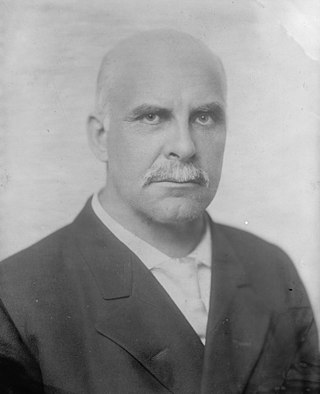
Eugene Wilder Chafin was an American politician and writer who served as the Prohibition Party's presidential candidate during the 1908 and 1912 presidential elections. He was active in local politics in Wisconsin, statewide elections in Wisconsin, Illinois, and Arizona, and campaigned throughout the United States and the world in favor of the prohibition of alcohol.
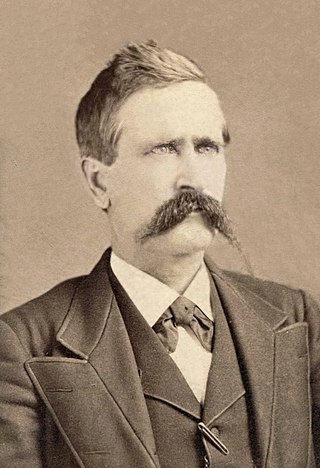
John Pierce St. John was an American politician who served as the eighth Governor of Kansas and later served as the Prohibition presidential nominee in 1884. Under his tenure as governor Kansas became the third state to enact a statewide prohibition of alcohol which would last until 1948 and remain in some form until 1987. After leaving elected office he maintained his position in the Prohibition party and remained active in the party's presidential politics and was a major figure in the party schism during the 1896 presidential election.

David Stewart was an attorney and politician from Baltimore, Maryland. A Democrat, he was most notable for his service in the Maryland Senate and his brief service as an interim U.S. Senator from 1849 to 1850.
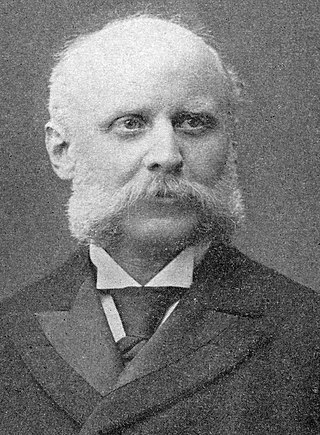
Joshua Levering was a prominent Baptist and a candidate for president of the United States in 1896. He was president of the trustees of The Southern Baptist Theological Seminary in Louisville, Kentucky, president of the Southern Baptist Convention, co-founder of the American Baptist Educational Society, and co-founder of the Layman's Missionary Movement.

William Daniel was an American politician from the state of Maryland. A lawyer, he was a noted prohibitionist and abolitionist. He served in both houses of the Maryland state legislature, first as a Whig, and later as a member of the American Party. Later, as a Republican, he was a member of the convention that wrote Maryland's constitution in 1864. He helped found the Maryland Temperance Alliance in 1872 and served as its president for twelve years. Daniel was the vice presidential nominee and running mate of John St. John on the Prohibition Party ticket in the presidential election of 1884. Placing third in the election that year, he continued his involvement with the cause of temperance until his death in 1897.

Hale Johnson was an American attorney and politician who served as the Prohibition Party's vice presidential nominee in 1896 and ran for its presidential nomination in 1900.
The 1920 Democratic National Convention was held at the Civic Auditorium in San Francisco, California from June 28 to July 6, 1920. It resulted in the nomination of Governor James M. Cox of Ohio for president and Assistant Secretary of the Navy Franklin D. Roosevelt from New York for vice president. The 1920 Democratic National Convention marked the first time any party had held its nominating convention in a West Coast city.
Earle Harold Munn was an American politician who served as the chairman of the Prohibition Party. With the Prohibition Party, he ran as a third-party candidate for President and Vice President of the United States.

The 1884 Republican National Convention was a presidential nominating convention held at the Exposition Hall in Chicago, on June 3–6, 1884. It resulted in the nomination of former House Speaker James G. Blaine from Maine for president and Senator John A. Logan of Illinois for vice president. The ticket lost in the election of 1884 to Democrats Grover Cleveland and Thomas A. Hendricks.

Charles Eugene Bentley was an American politician who served as the presidential nominee of the National Party, an offshoot party created by the broad gaugers faction of the Prohibition Party, during the 1896 presidential election.

James Britton Cranfill was an American religious figure and prohibitionist who served as the Prohibition Party's vice presidential nominee in 1892.

The 1872 Prohibition National Convention was a presidential nominating convention held at Comstock's Opera House, in Columbus, Ohio on February 22, 1872, to select the presidential ticket for the 1872 presidential election. It was the first presidential nominating convention of the newly organized Prohibition Party and would continue nominating presidential candidates in every presidential election leading it to become the longest continuous third party in the United States.
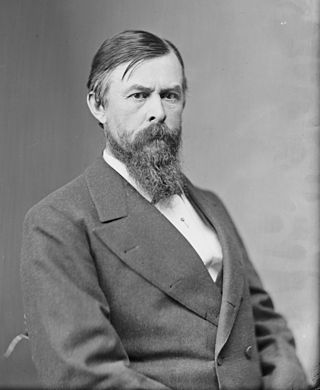
The 1876 Prohibition National Convention was a presidential nominating convention held at Halle's Hall, in Cleveland, Ohio on May 17, 1876, to select the Prohibition Party's presidential ticket for the 1876 presidential election.

The 1880 Prohibition National Convention was a presidential nominating convention held at Halle's Hall, in Cleveland, Ohio on June 17, 1880, to select the Prohibition Party's presidential ticket for the 1880 presidential election.

















